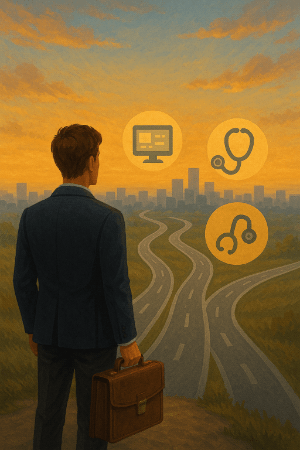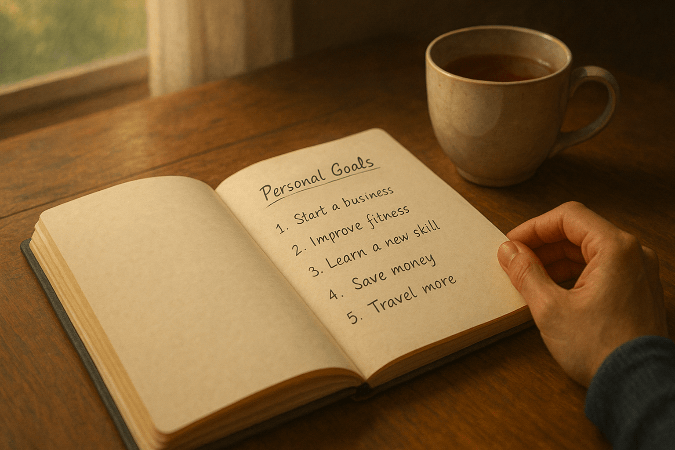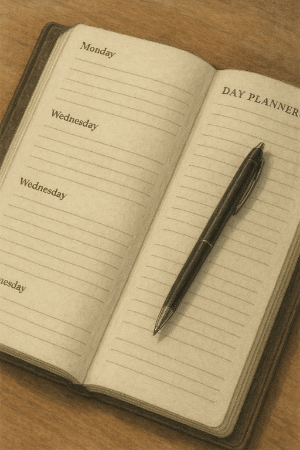Has the question “What should I do with my life?” been coming up for you more often lately?
That question trips up more people than you’d think—it’s one of the hardest and most freeing decisions you’ll ever face.

Why Everyone Wonders “What Should I Do With My Life” (Even If They Seem to Have It All Together)
Let’s get something out of the way up front.
Finally Finish What You Start
You don’t need more information. You need the accountability to execute.

If you’re wrestling with “What should I do with my life?” (and its close cousins, “Should I change careers?” or “Do I have a life’s purpose?”), know this: Most people don’t have one perfect, clear answer.
Even people who look like they have a dream career and a fulfilling life probably wonder the same thing from time to time.
You might picture them cruising through life, making all the right career choices, climbing the ladder, or launching Youtube videos about their fabulous success while you’re still googling “career path” at three in the morning.
Trust me—behind the scenes, everyone struggles with doubt.
The good news is you just need a repeatable process for moving forward, clarifying what’s important, doing a little research, and taking action.
Why This Question Stops So Many People
This question tends to stop people in their tracks because it feels so big—like you’re supposed to have one perfectly mapped-out answer for your whole life.
It’s easy to get stuck when the stakes seem that high.
The Pressure to Get It Right
Let’s be real—asking “What should I do with my life?” can feel like being dropped into the middle of the world’s toughest escape room.
You want a meaningful answer that covers your entire life—career, family, finances, even your sense of purpose.
But with all that pressure, it’s no wonder a lot of people freeze.
Maybe you worry about choosing the “right” or “wrong” answer and ending up stuck in a job you hate. Or family and friends all seem to expect you to magically figure it out the moment you leave school.
The truth? Not everyone has it mapped out. In fact, very few people do.
Overthinking Creates More Confusion
Spoiler alert: Overanalyzing every option—job, career, second career, or business path—just leads to more confusion.
You might find yourself watching videos on “What should I do with my life?” late into the night or spending time making giant pro-con lists.
What happens? Information overload and zero actual progress.
Sometimes, trying to find the ideal job just keeps you stuck in a loop. The result: You forget to act—life keeps moving, and you keep asking the same scary question.
You Don’t Need the “Perfect” Answer — You Need Progress
Here’s some wisdom: The world doesn’t offer a single “right” career.
What should you do with your life? There’s no perfect formula. The path forward is about making choices, testing ideas, and seeing what fits.
You don’t need a life plan that covers all the things, all at once. You just need a way to get unstuck and start moving.

The Myth of the Perfect Life Plan
When you’re wrestling with “What should I do with my life?,” it’s easy to get caught up chasing some mythic, perfect life plan.
But real clarity comes from action—not waiting around for the ultimate answer to magically appear.
Why Clarity Doesn’t Come From Thinking Alone
Dreaming, worrying, and journaling about your life’s purpose feels useful, but clarity comes from doing, not just thinking.
Career development is built step by step, not from having one single perfect answer whispered in your ear.
You need to actually spend time trying things, not just write about them, to figure out your next move.
What Most People Get Wrong About Finding a Career Path
Many people expect some magical “aha!” moment, where their ideal career bursts into view—complete with a soundtrack and instant positive feedback from everyone.
But honestly? Career choices usually start with small ideas.
Maybe you’re naturally good at helping friends solve problems or find yourself interested in digital marketing after trying an online course in your free time.
There’s rarely one big, perfect answer. Expecting that makes you miss the little signals that can lead you forward.
Here’s the biggest misconception: Many people think choosing a career path is a single, life-defining decision where you either find your dream job—or you’ve blown your shot.
That’s just not how it works. The reality is, career development is rarely a straight line with a giant, flashing “correct answer” at the end.
Common mistakes people make:
- Believing there’s only one “right” or “wrong” answer. There are usually several paths that could lead to a fulfilling career (or even a high-paying job).
- Assuming you have to figure it all out before you act. Not everyone knows their life’s purpose in advance—most figure it out gradually, by trying things and learning along the way.
- Comparing your journey to friends, family, or even Youtube videos. Just because someone else seems to have the ideal job doesn’t mean their path was clearer (or easier) than yours.
The real secret? You don’t have to have it all figured out before moving forward.
Small steps, a little research, and experimenting with different roles will help you learn and adjust as you go. Let go of the myth that there’s one perfect course—your path forward will unfold as you take action.
Replace Big Decisions with Small Experiments
Instead of staking your whole life on one huge leap, focus on experiments.
Want to know if you’d like a high-paying job in tech? Spend time shadowing someone. Interested in starting a second career? Try an online class for a month. Love writing? Submit a guest post somewhere, or start a blog of your own.

A Simple 4-Step Process to Get Unstuck and Moving Forward
I really encourage you to stop looking for all the answers at once. Here’s a process you can use right away (no existential dread required):
Step 1 — Pause and Reflect (15–30 Minutes)
Take a focused break from all the hustle and start by simply reflecting.
Ask What You Want More or Less Of
Grab a notebook—no need to write a novel. Jot down what’s energizing in your current life and what’s draining.
- What do you want more of in your ideal job?
- What tasks or moments do you want to spend less time on?
- Which activities give you positive feedback, even if they’re not officially part of your job?
Thinking about ways you already spend your free time—like volunteering, joining a book club, or researching career advancement options—can also spark ideas.
Identify Curiosities, Not Commitments
This is NOT about deciding your entire career path in one sitting.
Instead, make an immediate list of things you’re curious about—subjects, skills, or fields you might want to learn more about.
- Are you drawn to online marketing, tech, health, nonprofit work?
- Do you imagine yourself teaching, leading, writing, or building something?
The goal isn’t to decide—it’s to notice what keeps catching your attention. (This article from Psychology Today explains how curiosity fuels better career decisions.)
Step 2 — Pick a Direction, Not a Life Decision
Think in 30–90 Day Sprints
Instead of thinking, “How do I figure out what I should do with my whole life?” Ask yourself, “What do I want to try in the next 30, 60, or 90 days?”
Short sprints make big questions less intimidating—and way more doable.
Keep Stakes Low, Interest High
You don’t have to commit to law school or a brand new career just yet. Keep your experiments easy to start, easy to quit.
- Take a free online course in online marketing.
- Shadow a friend at their job.
- Volunteer one afternoon a week.
- Set up informational interviews with people in jobs you’re interested in.
If you pick a direction based on curiosity instead of pressure, you’ll learn faster—and lose far less sleep.
Step 3 — Run a Tiny Experiment
Explore Without Pressure
It’s normal to feel like every step is going to make or break your entire future—but most “first steps” are actually very low risk.
Think of it like taste-testing at an ice cream shop. You’re just sampling, not signing a lease.
Examples of Easy First Steps Toward a Dream Career
- Want to write? Start a daily journal, guest post for a website, or join a writing group.
- Interested in tech? Build a simple website or take a two-week coding challenge.
- Thinking about becoming a coach or counselor? Volunteer to listen at a local support center.
- Curious about switching careers? Job-shadow a friend, join a related online community, or interview someone in the field.
- Looking at digital marketing? Offer to manage the newsletter for your book club or help a small business build their online presence.
Here’s the IDEO method for easy, real-world experiments that can spark insight in your career and life.
Step 4 — Reflect and Adjust
What Felt Energizing?
After your experiment—whether it’s a two-day trial or a month-long side project—pause and tune in.
- Did you feel more energized or drained?
- Did the world seem a bit bigger and brighter, or a bit dull?
- Did a certain activity make you forget to check your phone or watch the time?
These are clues about what you’re naturally good at and what could lead to a full life.
Use Your Results to Refine Your Path
Every experiment gives you data. Write down what worked, what didn’t, and what ideas emerged in the process.
You might discover a new skill that leads to more career choices, or realize that something you expected to love just isn’t your thing.

Why This Process Works
You Build Clarity Through Action
Thinking alone is a trap. You only figure out “what should I do with my life” by doing — not by waiting for inspiration to strike.
Taking tiny steps builds real-world knowledge and confidence. As LifeHack points out, clarity comes after the action, not before.
Tiny Wins Create Momentum
Small wins, like a single positive feedback note from a colleague or the thrill of finishing an online course, boost your motivation.
Momentum pulls you forward—and suddenly, career decisions stop feeling so heavy.
It’s Adaptable, Not All-Or-Nothing
Your path doesn’t have to be perfect or final. It adapts with you as you spend time learning, growing, and changing.
This is how a lot of people really build a fulfilling career (and a fulfilled life!)—not by planning it all out, but by taking the next step and adjusting as they go.
How to Be Kinder to Yourself (So You Can Move Forward)
Asking, “What should I do with my life?” is tough enough without your inner critic shouting from the sidelines. Too often, people freeze not just because they lack direction, but because they’re judging themselves for not already knowing the answer.
If you’ve ever caught yourself thinking, “I should have figured this out by now,” or “Everyone else is ahead of me,” you’re not alone.
Why Self-Compassion Matters More Than You Think
Here’s some wisdom you might not hear enough: You can’t shame or criticize yourself into clarity. Instead, growth comes from a place of kindness and patience—just like you’d encourage a good friend who’s struggling.
Psychologist Kristin Neff—one of the leading researchers on self-compassion—has found that people who practice kindness toward themselves are actually more resilient in the face of setbacks, and more likely to take positive action. If you’re constantly berating yourself for not having a perfect life plan, it actually makes it harder to think creatively or try new things.
So, before you make your next big decision, let’s shift the way you talk to yourself.
4 Ways to Practice Self-Compassion as You Figure Things Out
1. Notice Your Inner Dialogue
Start by paying attention to how you talk to yourself about career, purpose, or even small setbacks. Are you being supportive—or more like a drill sergeant? When you catch harsh self-talk, pause and ask: “Would I say this to a close friend?” If not, it’s time for a kinder script.
2. Drop the Timeline Comparison Game
Maybe you feel “behind” because a college friend just posted about their third promotion, or your sibling seems to have a dream life. Truth is, everyone moves at their own pace. Remind yourself: It’s okay to be a ‘work in progress.’ Your journey doesn’t need to follow someone else’s schedule.
3. Celebrate Small Wins
Struggling with big choices? Focus on little progress. Did you research a new field, send an email, or read this article to the end? Give yourself credit! Small wins add up, building confidence and momentum over time.
4. Allow Yourself to Take Breaks
Feeling stuck or burned out often means you’re trying—sometimes too hard. It’s okay to hit pause. Take a walk, chat with a supportive friend, or just let yourself rest for a night. Your clarity will come back faster if you aren’t running on empty.
Kindness Isn’t Laziness—It’s Fuel for Growth
Here’s the bottom line: Being gentle with yourself isn’t about lowering your standards or giving up. It’s about creating the space and safety your brain needs to try new things, make mistakes, and—bit by bit—find what feels right.
When you treat yourself with compassion, you’ll find it’s much easier to brainstorm ideas, experiment with new directions, and even ask for support when you need it. And that’s exactly what moves you forward.
So, the next time you’re stuck in the “what should I do with my life?” spiral, remember: the first—and most important—step might just be offering yourself a bit more kindness on the journey. You’ll be surprised how much clearer the path can get when you’re on your own team.

Common Pitfalls (and How to Avoid Them)
Mistake #1 — Waiting for Perfect Clarity
If you wait for the world’s most satisfying answer to appear—you might stay stuck forever.
Look around: the most interesting people often start exploring before they “know.” Action comes before certainty.
Mistake #2 — Turning Experiments Into Pressure
Remember, the goal is to explore, not to get graded by family members or friends. If you treat every tiny step like it must lead to a high-paying job or guaranteed money, you’ll never try at all.
Keep the stakes low while you figure things out.
Mistake #3 — Treating Every Idea Like It Has to Be a Full-Time Job
You don’t need to quit your job, sell your house, or start law school to chase a curiosity. Let yourself try things out, even if they don’t become a new career. Not every interest has to become your life’s work.
Ready for Support? How Coaching Helps You Stay Focused
Feeling stuck or overwhelmed is totally normal when you’re trying to figure out what to do with your life.
You don’t have to figure it all out on your own—sometimes, just having the right support can make all the difference.
If you want to feel more confident (and less lost) on this journey, outside guidance can help you get there faster.
Coaching Helps You Experiment, Reflect, and Move Forward Faster
Sometimes, the biggest challenge isn’t coming up with career ideas—it’s actually acting on them when you feel stuck or alone.
That’s where coaching comes in. A great coach will help you clarify what you want, design tiny experiments, and reflect on your results—helping you avoid common traps and keep moving forward.
Plus, a coach gives you someone to talk to—a person outside your friends and family who’s there to support your growth and decision-making.
If you’re ready for that kind of tailored support to help you get on your path, consider reaching out for a free consultation.
Final Thoughts
When you ask, “what should I do with my life?” Don’t expect to answer it once and for all. It’s a process—one filled with experiments, reflection, action, and course corrections.
Start small, get curious, and give yourself room to grow. Your dream career—and a more fulfilled life—are built brick by brick, not overnight.
Remember: Any step forward beats standing still. So act, reflect, and keep moving forward. You might just surprise yourself.






